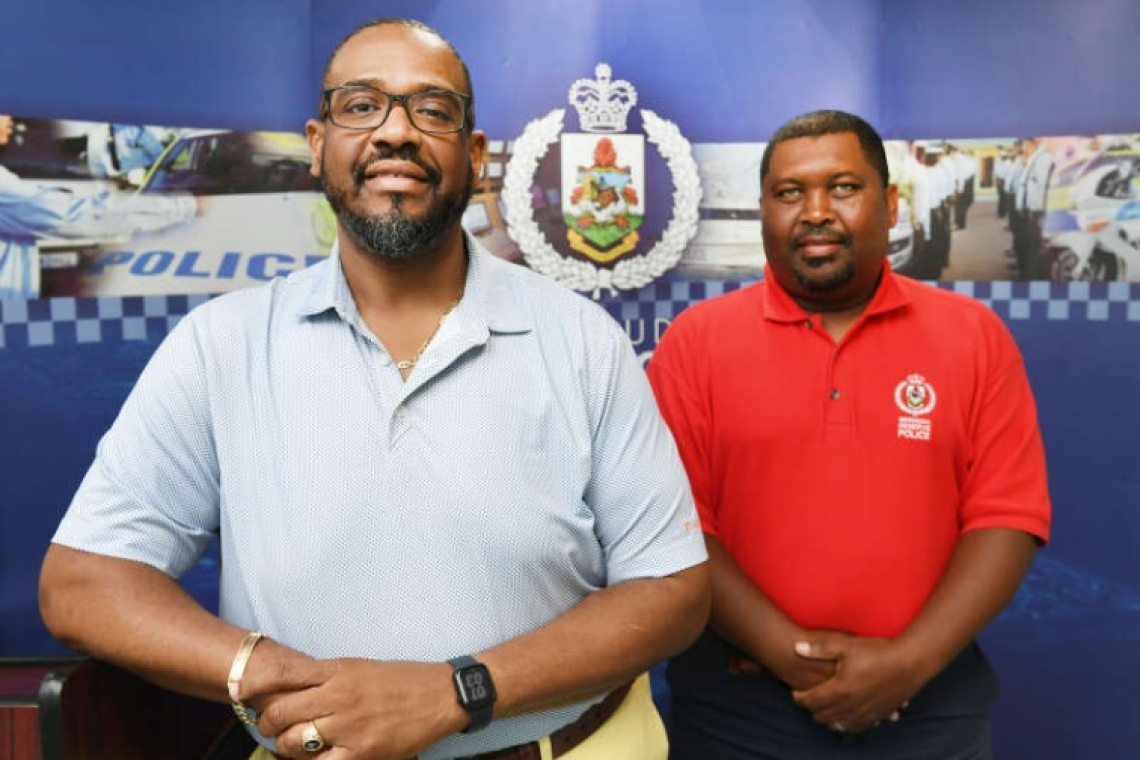Commandant of the Bermuda Reserve Police Ron-Michel Davis (left) with Deputy Commandant Shawn Russell.
HAMILTON, Bermuda--Membership in the Bermuda Reserve Police (BRP) has plummeted by more than 80% since 2001, Commandant of the organisation Ron-Michel Davis revealed.
Davis said that they were 150-strong when he and Deputy Commandant Shawn Russell joined 23 years ago, but they now have only 25 members.
The circumstances meant that members of the BRP’s executive took on shifts alongside rank-and-file officers when the reserves were embodied recently for four weeks.
Davis attributes the low numbers to a change in entry requirements, which are now identical to those in place for anyone who wishes to become a full-time police officer.
He said: “Back when we joined you signed up, had a home interview and went to your doctor to get signed off; there was no physical, psychological or written assessment. Now you have to go to the police doctor and have to take all the assessments. There are not many people in the 21st century who will volunteer to put themselves in harm’s way, so that has aided the low numbers as well.”
Joining the reserve police was at one time an alternative to military conscription, but Russell said the formal ending of that practise in 2018 and the change in requirements for BRP recruits was a “double hit” for membership.
He said: “Over the years, some of our applicants have come initially to join the reserves, and once they feel they’ve made it so far, they switch and go full time with the [Bermuda Police Service – Ed.] BPS.”
Governor Rena Lalgie called for the full embodiment of the reserve police from July 11, to August 9. It came after four people were found dead inside an apartment on South Terrace in Pembroke and two men were killed near Scaur Hill in Sandys. The incidents happened as BPS officer numbers stood at a 45-year low. It was the first time the reserves were fully embodied since the coronavirus COVID-19 lockdown in 2020.
Davis explained: “Legislation says that the governor can order full embodiment and our officers have to show up any date and time that they are told. Up until August 9, we had to provide four officers per shift per day, or eight officers a day, out of an operational number of 16. We could not do that, which meant that the executive had to come out and work shifts as well, so it was all hands on deck.
“They would work two days, two nights and have four days off for the entire period. Their employers were given a copy of the gazetted order and their employers ensured that they had the time.”
Davis said he hoped to see between 60 and 75 total officers in the organisation, but noted that they were not completely bereft of new recruits – seven applicants are due to undergo training pending results from medical and psychological assessments. If accepted, the recruits will be taught the basics of policing for 16 weeks and be paired with a senior officer for another eight before going out on their own. They are required to complete a minimum of 13 hours a month, which includes a two-hour meeting.
Davis said: “That is all we demand, but we appreciate more. We have officers that are doing 300 hours a month; we have a few high-flyers who you would think this was their day job. Some people are just establishing their careers already and they just want to give back to the community and they love policing. The reserves give people an opportunity to take on training courses and driving courses … that have now come into fruition that we never had in the 23 years that we’ve been here.”
Officers receive a stipend for their service, and although a commitment of at least three years is encouraged, they can leave the organisation any time they wish.
Davis, an assistant immigration officer at Conyers, has been the commandant since June 2023 and said the BRP allowed him to pursue his passion for law enforcement while having a different full-time job.
He explained: “If you have a genuine interest in policing and you want to give back to your community, then this is the place for you.”
Russell, who works in information technology (IT), enlisted in the reserves instead of the Bermuda Regiment when he was conscripted and did not plan to spend more than three years with the organisation.
He said: “I can do policing and get that excitement that I want, and I can go back to my regular job, so it was the best of both worlds.”
Russell added that recruits should come to the organisation “with the mindset that they’re coming to make a difference”.
Bermuda residents between 18 and 57 can apply to be in the BRP and can visit bermudapolice.bm/content/join-reserves, e-mail This email address is being protected from spambots. You need JavaScript enabled to view it. or call 247-1787 to learn more. ~ The Royal Gazette ~







